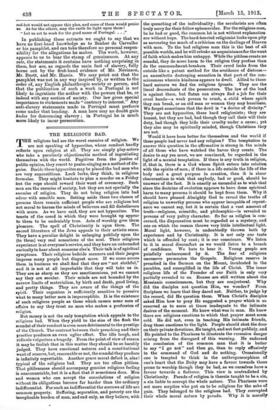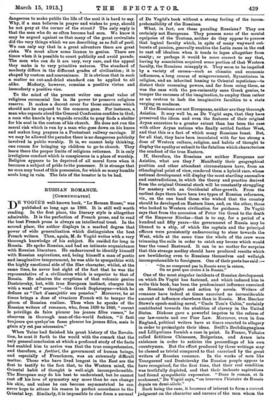THE RELIGIOUS BAD.
THE religions bad are the worst enemies of religion. We are not speaking of hypocrites, whose conduct hardly reflects upon religion at all. They are simply play-actors who take a peculiarly objectionable method of ingratiating themselves with the world. Fugitives from the justice of public opinion, they resort to psalm-singing as a method of dis- guise. Beside these hypocrites may be placed the had men who are very superstitious. Luck lurks, they think, in religious formulae. They might hesitate to plan a murder on a Friday lest the rope should reward their want of ceremony. Such men are the enemies of society, but they are not specially the enemies of religion. They do not bring religion into bad odour with sensible men. Setting aside these two classes of persons there remain sufficient people who are religions but not moral to harass the minds of believers and fill disbelievers with scorn. As we have said, they are not hypocrites. The tenets of the creed in which they were brought up appear to them to be undeniably true. Acts of worship give them pleasure. The spell of Christianity is upon them. The sacred literature of the Jews appeals to their artistic sense. They have a peculiar delight in enlarging publicly upon the (to them) very real sensations of the soul. Their religious experience is at everyone's service, and they have an unbounded curiosity to hear about someone else's. Their talk is of spiritual symptoms. Their religious bedside manners and their jargon impress many people but disgust more If we come across them in business we shall find that they are "not slothful," and it is not at all improbable that they will take us in. They are as sharp as they are sanctimonious, yet we cannot say they are secular. Their minds are not bounded by the narrow limits of materialism, by birth and death, good living, and pretty things. They are aware of the things of the
spirit. Their organism is sufficiently sensitive to perceive what to many better men is imperceptible. It is the existence of such religions people as these which causes some men of affairs to say they trust no man who makes a profession of religion.
But money is not the only temptation which appeals to the religious bad. When they yield to the sins of the flesh the scandal of their conduct is even more detrimental to the prestige of the Church. The contrast between their preaching and their practice produces an even uglier effect. The idle laugh, and ridicule vulgarizes a tragedy. From the point of view of reason it may be foolish that in this matter they should be so harshly judged. They have emotional natures and a constitutional want of reserve, but, reasonable or not, the scandal they produce is infinitely regrettable. Another grave moral defect is, alas ! typical of the religious bad. They are too often pitiless. That pitilessness should accompany genuine religious feeling is unaccountable, but it is a fact that it sometimes does. Men and women who can accept the consolations of religion without its obligations become far harder than the ordinary indifferentist. For such an indifferentist the sorrows of life are common property. Suffering, separation, and poverty are the inexplicable burden of man, and end only, as they believe, with the quenching of the individuality ; the secularists are often truly sorry for their fellow ephemeridae. For the religious man, be he bad or good, the common lot is not without explanation nor without hope. The bard-hearted religionist looks upon pity as savouring too much of a criticism on the dealings of Heaven with men. To the bad religious man this is the best of all possible worlds, and he will rebuke an acquaintance for the want of faith which makes him unhappy. While the pitiless create no
scandal, they do more harm to the religion they profess than do the commandment-breakers. Their creed looks from the outside like a patent method for the avoidance of distress— an anaesthetic destroying sensation in that part of the con- sciousness wherein kindness appears to dwell. Allied to these hard natures we find the religious tyrants. They are the lineal descendants of the persecutors. The law of the land is against them, but Satan can always find a job for their cruel hands—a weak person to crush, a child whose spirit they can break, or an old man or woman they may humiliate. We forget sometimes that the devil is "a doctor of divinity." They are not hypocrites, these bard religionists ; they are honest, but they are bad, bad though they call their will their duty, bad though they hide their cruelty under a cause ; yet they also may be spiritually minded, though Christians they are not.
Would it have been better for themselves and the world if these people had never had any religion P The temptation to answer this question in the affirmative is strong in the minds of all those who have watched the havoc they create. Tho desire to say yes must, we are convinced, be regarded in the light of a mental temptation. If there is any truth in religion, if, that is, there is a God whose Spirit enters into relation with the spirits of men ; if there is a life outside the life of the body and a great purpose in creation, then it is sheer obscurantism to wish that anybody, bad or good, should be unaware of the fact. It is exactly as uncandid as to wish that since the doctrine of evolution appears to have done spiritual harm to many persons it should be kept from them. Why it should have pleased Almighty God to reveal the truths of religion to unworthy persons who appear incapable of repent- ance we cannot say, but it is certain that a vast amount of truth—religious, scientific, and philosophic—is revealed to persons of very paltry character. So far as religion is con- cerned, the dispensation must be regarded as a mystery, and one on which the reason throws very little intellectual light. Moral light, however, is undoubtedly thrown both by experience and by Christianity. It is not only our taste which is offended by cant ; it is our conscience. We listen to it in moral discomfort as we would listen to a breach of confidence. We hate to hear it. Young people are painfully embarrassed by it. The fear of religious unreserve permeates the Gospels. Religious reserve is preached in the Sermon on the Mount, inculcated in the parables, and exemplified in the life of Christ. The inner religious life of the Founder of our Faith is only very partially revealed to us. Reams are still written about the Messianic consciousness, but they are conjectural. Why did the disciples not question Him, we wonder? From Scripture we learn that they dared not. Neither, to judge by the record, did He question them. When Christ's disciples asked Him how to pray He suggested a prayer which is so reserved as to seem at times inadequate to the intimate desires of the moment. He knew what was in man. He knew there are religious emotions to which that prayer must seem cold. He did not, even in teaching His intimate friends, drag those emotions to the light. People should shut the door on their private devotions, He taught, and not fast publicly, and He pointed to the Pharisees to illustrate the excessive danger arising from the disregard of this warning. He endorsed the conclusion of the common man that it is better to say "I go not" and then go, than to reply effusively to the command of God and do nothing. Occasionally one is tempted to think in the anthropomorphism of one's heart that the Deity may have a favour towards those prone to worship though they be bad, as we ourselves have a favour towards a flatterer. This view is contradicted by Christianity. Parade of religion is therein taught to be a sin, a sin liable to corrupt the whole nature. The Pharisees were not mere sceptics who put on to be religious for the sake of gain. They belonged to the religions bad. They corrupted their whole moral nature by parade. Why it is morally
dangerous to make public the life of the soul it is hard to say. Why, if a man believes in prayer and wishes to pray, should he not pray at the corner of the street ? The only reply is that the men who do so often become bad men. We know it may be argued against us that many of the great revivalists did the very things which we are describing as so full of peril. We can only say that in a great adventure there are great ,risks. We must allow some licence to genius. There are times when it is possible to court publicity and avoid parade. The men who can do it are very, very rare, and the appeal they make is to very primitive natures. The standard of modesty differs in the different grades of civilization ; it is shaped by custom and convenience. It is obvious that in such a matter no cut-and-dried standard can be applied to all alike. Modesty, however, remains a positive virtue and immodesty a positive vice.
To the mind of the present writer one great value of religious ceremonial lies in its power tar preserve religious reserve. It makes a decent cover for those emotions which should not be exposed to the common gaze. For instance, a man who repeats aloud the General Confession confides in God; a man who kneels by a wayside crucifix to pray finds a shelter for his soul in the custom of his church. He does not run the moral risk which is run by a man who goes down on his knees and makes long prayers in a Protestant railway carriage. If we may be allowed the paradox there is no dangerous publicity involved in public worship. It is, we cannot help thinking, one reason for bringing up children to go to church. They learn there the proper limits of religious reticence. It is only irreligious conduct which is conspicuous in a place of worship. Religion appears to be deprived of all moral force when it becomes a subject of pride to the possessor. It is strange that no man may boast of this possession, for which so many humble souls long in vain. The fate of the boaster is to be bad.















































 Previous page
Previous page